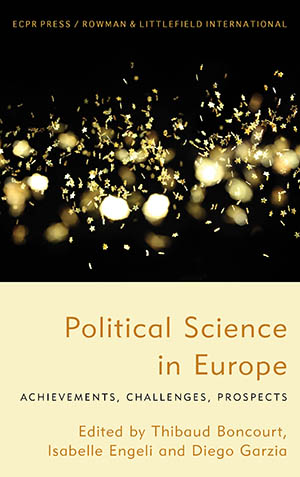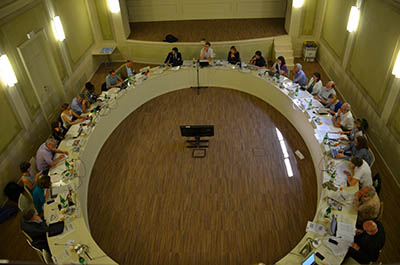ECPR 50th Anniversary volume
 2020 marks half a century since ECPR’s creation. Among the many initiatives to mark this milestone 50th anniversary, we are delighted to publish a new volume under the ECPR Press imprint, in which contributors from across the world reflect on the evolution of, and prospects for, our discipline in Europe.
2020 marks half a century since ECPR’s creation. Among the many initiatives to mark this milestone 50th anniversary, we are delighted to publish a new volume under the ECPR Press imprint, in which contributors from across the world reflect on the evolution of, and prospects for, our discipline in Europe.
Our challenge
Since the mid-twentieth century, the number of university departments, professional associations, and scientific journals dedicated to the discipline has risen steadily. Political science also attracts a substantial share of European funding for the social sciences and humanities.
But the discipline suffers from a general decline in the amount of public money available for research ꟷ and from the rise of precariousness in academia. Political scientists come under fire from politicians and activists who criticise its alleged ideological biases and contest scholarly expertise. The discipline is being pressured to justify its market value by producing more, and by being forced to prove its impact and relevance.
Our vision
This new book takes stock of how the discipline has been built, what state it is in, what its achievements are, and what challenges it faces. It hopes to refine our understanding of the direction in which political science is going intellectually, and to feed professional debates about its structures and institutions.
Contributions tackle such diverse questions as the distinctive intellectual character of European political science, its impact on society in general, the threats and tensions it is subjected to, and its inclusive character as a profession.
 Taking shape
Taking shape
Our aim was to produce a coherent volume with a measure of dialogue between contributions. To this end, all contributing authors were brought together for a workshop in June 2019 at European University Institute in Florence, to discuss three key questions for political science in Europe:
- Is there a distinctive European blend of political science?
- Is political science in Europe cohesive as a profession?
- What is the current status of the relationship between the discipline and its environment?
Achievements, Challenges, Prospects
The resulting volume focuses on the structural (European), rather than individual (country), level. Contributors come from different countries and continents, generations, levels of seniority, genders, and ethnic backgrounds, offering an analytical take on the discipline that is diverse enough to feel inclusive and ring true to its equally diverse potential readership.
The three-part book also bridges the gap between the social and intellectual sides of disciplinary history: for example, the history of shifts in the objects that political science studied over time is shown to be partly linked to broader evolutions in society, particularly in social movements, and the story of professional associations is told in relation to that of paradigm and methods debates.
Part One situates political science in Europe in relation to the rest of the world at the level of concepts, objects, and methods. It depicts ‘European political science’ as a broad church, characterised by a historical and ever-increasing diversity of objects, approaches, and methods, fed by the diversity of European political systems and lives themselves. Diversity, however, goes together with tensions and the challenge of keeping this heterogeneous community together.
Part Two assesses the professional structure and inclusiveness of the discipline. It examines the extent to which European political science is cohesive as a profession and inclusive as a scholarly community. It portrays a profession that is challenged at several levels. The case of associations shows the extent to which intellectual differences may jeopardise the discipline’s cohesiveness. European political science also suffers from strong national divides, most notably between Western and Eastern Europe, and from difficulties in integrating scholars from diverse gender, race, ethnic, religion, sexual preference, and class backgrounds.
Part Three examines the evolving relationship between the discipline and its social and political environment. It poses the questions: To what extent is the very existence of European political science threatened? How does it cope with the pressures it is subjected to? What are the challenges that come with the ambition of being ‘relevant’ to power and society?

